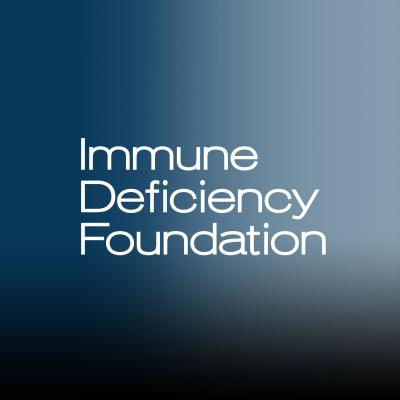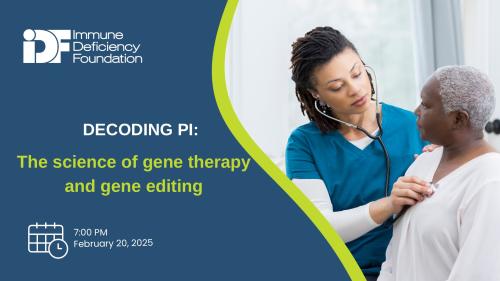
-
Understanding primary immunodeficiency (PI)

Understanding PI
The more you understand about primary immunodeficiency (PI), the better you can live with the disease or support others in your life with PI. Learn more about PI, including the various diagnoses and treatment options.
-
Living with PI
-
Addressing mental health
-
Explaining your diagnosis
- General care
- Get support
- For parents and guardians
-
Managing workplace issues
- Navigating insurance
-
Traveling safely

Living with PI
Living with primary immunodeficiency (PI) can be challenging, but you’re not alone—many people with PI lead full and active lives. With the right support and resources, you can, too.
-
Addressing mental health
-
Get involved

Get involved
Be a hero for those with PI. Change lives by promoting primary immunodeficiency (PI) awareness and taking action in your community through advocacy, donating, volunteering, or fundraising.
-
Advancing research and clinical care
-
Grants
-
IDF surveys
-
Participating in clinical trials
-
Diagnosing PI
-
Consulting immunologist
-
Clinician education

Advancing research and clinical care
Whether you’re a clinician, researcher, or an individual with primary immunodeficiency (PI), IDF has resources to help you advance the field. Get details on surveys, grants, and clinical trials.
-
Grants
Sisters Ava and Oliva Langenhop, rising third and second graders respectively, can’t wait to return to school and take classes in the gifted program this year. While Ava, 8, likes to sing and wants to learn piano, Olivia, 7, joined the cheer and tumble team. Their little brother, Landon, 4, likes running, climbing, playing outside, and being with his big sisters.
Their lives are so busy, and their children so healthy, that parents Jon and Alicia Langenhop have had little time to reflect on their family’s journey with leukocyte adhesion deficiency 1 (LAD-1). Four years ago, all three children were diagnosed with LAD-1 and within months treated with curative gene therapy through a clinical trial at the University of California Los Angeles (UCLA). A rare primary immunodeficiency (PI), LAD-1 causes bacterial infections and inflammation that can severely shorten the lives of those with the condition.
Several years post-transplant, the Langenhop children rarely get sick, and cuts and scrapes heal with no problem.
“Before we had a diagnosis there were a lot of ups and downs because there were hospital visits and bills for years, so it was overwhelming, and it was tough,” said Alicia Langenhop.
“But once we found out the severity of LAD-1 and the gravity of the situation, we were in work mode, trying to figure out the next steps. All of a sudden, we were in California for eight months and going through the trials.
“It was like a whirlwind. I don’t know that I’ve processed all of it. I only know that we’re on the other side—and our attitude has changed from hopeless to happy and grateful.”
LAD-1 began causing illness in the Langenhop family right after Ava was born. Hospitalized at three weeks old due to a fever, and a few weeks later because of respiratory syncytial virus (RSV), Ava developed ear infections every other month, rashes, and infected cuts. Her sister Olivia also had regular ear infections, recurrent cases of the flu, and mouth sores so painful that she lost 15% of her body weight at 18 months old.
“It was horrible, and they couldn't figure out what it was for the longest time, and within two months after that, she had croup, the flu, and pneumonia at the same time. She was in the intensive care unit with that, so that was the scariest one,” said Alicia Langenhop.
The Langenhops took Ava to a periodontist when she was 3 because her gums were inflamed and bleeding. He’s the provider who recommended they seek testing for an immune deficiency.
When they learned Ava had LAD-1, they tested Olivia whose results showed she was also affected. The couple then allowed doctors to test Landon, born six weeks after the girls’ diagnosis. A positive test from Landon sent the couple down the path of seeking donors for bone marrow transplants for all three children.
News stories about the family reached the UCLA research lab and a lab representative contacted the family about the gene therapy clinical trial for LAD-1. Now complete, the clinical trials yielded a 100% survival rate for the nine participants, which included the Langenhop children. Rocket Pharma, the company that produces the gene therapy product, is currently working with the Food and Drug Administration (FDA) to seek approval for this gene therapy.
“Pretty much once we had heard about (the gene therapy clinical trial), we were sold. When we got the diagnosis, they told us that bone marrow transplant had a 75% survival rate and we have three kids, so that wasn't acceptable to roll the dice with that,” said Alicia Langenhop.
“Jon started looking to see if there were any other alternatives and he didn’t see any specific studies but did see that for other immunodeficiencies, there had been gene therapy trials. When they did reach out, and we found out that there was a trial, it was a no-brainer.”
Rather than fly back and forth between each transplant, the Langenhops stayed at an apartment within walking distance of the hospital from May until just before Christmas when they returned to their home in Ohio. The treatments started at the beginning of the pandemic in the spring of 2020.
“Since they had it done during the pandemic, it kind of worked out. Everyone was already in isolation. And the planes we flew back and forth on were practically empty,” said Alicia Langenhop. “And there was also another benefit. Everybody was wearing a mask, so it was a little safer than normal.”
Alicia Langenhop said that she and her family relied on the outpouring of love from her community to navigate the stressful medical journey.
“We had a huge support system from a lot of family and friends. They hosted fundraisers and spread the word and just rallied around us, so I think that helped,” said Alicia Langenhop. “Even though we were kind of alone in that not many other families were going through what we were, we never really felt alone.”
The Langenhops grew close to the immunologist who performed the gene therapy, Dr. Donald Kohn, director of the UCLA David Geffen School of Medicine Human Gene and Cell Therapy Program. During the summer, when the family was living by themselves in Los Angeles, he invited them over for pizza and a swim in his pool. The couple praised both his skill and his compassion.
“We love getting to see Dr. Kohn. We all see him on a Zoom call every now and then, and then anytime we go out to California, we make sure we see him,” said Alicia Langenhop. “He's amazing.”
Watch 2024 PI Conference sessions
Missed a session or want a refresher? 2024 PI Conference session recordings are now available!
Browse sessionsRelated resources
Sign up for updates from IDF
Receive news and helpful resources to your cell phone or inbox. You can change or cancel your subscription at any time.





The Immune Deficiency Foundation improves the diagnosis, treatment, and quality of life for every person affected by primary immunodeficiency.
We foster a community that is connected, engaged, and empowered through advocacy, education, and research.
Combined Charity Campaign | CFC# 66309




